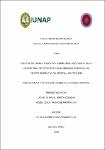Efectos de charla educativa sobre cepillado dental en la higiene oral de pacientes con diversidad funcional en Centro de Educación Especial, Iquitos-2019

View/
Date
2020Author
Arista Icomena, Jackelyn Mabel
Taminche Rimarachin, Nobel Jesus
Metadata
Show full item recordAbstract
Objetivo: Determinar los efectos de una charla educativa sobre cepillado dental en la higiene oral de pacientes con diversidad funcional de un Centro de Educación Especial, Iquitos - 2019. Materiales y Métodos: Investigación tipo cuantitativo, diseño cuasi experimental en dos grupos no equivalentes, con Pre-test y Post-test. Población: Conformada por 68 estudiantes del CEBE 9 de Octubre con diagnósticos de Síndrome de Down (SD) leve - moderado y Trastorno del Espectro Autista (TEA) leve – moderado. Muestra: Censal; se tomó la misma población distribuida en dos grupos, uno de control con 34 estudiantes y otro del grupo experimental con 34 estudiantes. Técnica: Observación. Instrumento: Ficha de Índice de Higiene Oral. Resultados: En el grupo de control Pre-test los hallazgos indican que de un total de 34 (100%) estudiantes, el 8.8% (3) obtuvieron un índice de higiene bueno, 38.2% (13) obtuvieron un índice de higiene regular y el 52% (18) obtuvieron un índice de higiene oral malo; en el grupo de control Post-test no hubo cambio significativo, mientras que, en el grupo experimental Pre-test indica que de un total de 34 (100%) estudiantes el 52.9% (18) obtuvo el índice de higiene regular, el 47.1% (16) obtuvo el índice de higiene malo; en el grupo experimental Post-test de 34 (100%) estudiantes el 20.6% (7) obtuvo un índice de higiene bueno, el 52.9% (18) obtuvo un índice de higiene regular, mientras que el 26.5% (9) obtuvo un índice de higiene malo. Conclusiones: La charla educativa sobre cepillado dental tiene efectos positivos en la higiene oral de pacientes con diversidad funcional en el CEBE, Iquitos (tc= 5.472 gl= 33 p=0.000) Objective: To determine the effects of an educational talk on tooth brushing in oral hygiene of patients with functional diversity of a Special Basic Education Center (CEBE), Iquitos, 2019. Materials and Methods: It quantitative with a quasi-experimental design with two groups non-equivalent, with Pre-test and Post-test. Population: It was made up of 68 students from the CEBE October 9th with diagnoses of mild - moderate Down Syndrome and mild - moderate Autism Spectrum Disorder. The sample: Was census because the same population was taken distributed in two groups, one control with 34 students and the other was experimental group with 34 students. Technique: Observation. Instrument: observation sheet. Results: In the Pre-test control group the finding indicate that in a total of 34 (100%) students, 8.8% (3) obtained a good hygiene index, 38.2% (13) obtained a regular hygiene index and 52% (18) obtained a bad oral hygiene index; in the Post-test control group there was no significant change, while in the Pre-test experimental group indicate that in a total of 34 (100%) students, 52.9% (18) obtained a regular hygiene index, 47.1% (16) obtained a bad hygiene index; in the Post-test experimental group with 34 (100%) students, 20.6% (7) obtained a good hygiene index, 52.9 (18) obtained a regular hygiene index, while 26.5% (9) obtained a bad hygiene index. Conclusions: The educational talk about tooth brushing has positive effects on oral hygiene of patients with functional diversity in a Special Education Center, Iquitos (tc = 5.472 gl = 33 p = 0.000)
Collections
- Tesis [188]

